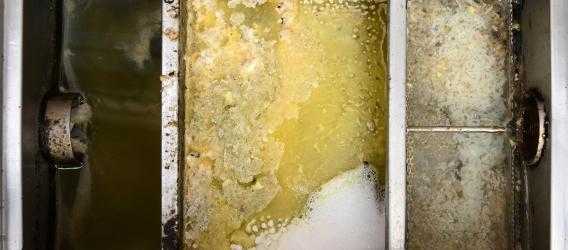Any business that has a valid Food Establishment Permit is required to install a grease interceptor. If a Hydromechanical Grease Interceptor is installed it is required to have a visible certification attached verifying that it meets there requirements of ASME A112.14.3/CSA B481.1 or ASME A112.14.4/CSA B481.5 and it must be maintained on a regular basis. The Pollution Prevention team regularly inspects restaurants and other FSEs to confirm that:
- Grease interceptors discharge to the wastewater system, not the stormwater system
- Grease interceptors are in compliance with the Building Code Act, the Building Code Regulations, as well as CSA and ASME standards
- Grease interceptors are cleaned out on a monthly basis, or when the total grease and solids layer reaches 25% of the interceptor volume, whichever happen first.
- The business has up-to-date maintenance records for grease interceptors available for the last two years
- Enzymes, solvents, hot water or other prohibited agents are not used as a means of maintaining a grease interceptor
The full list of Grease Interceptor requirements, along with information that will help size one for your kitchen can be found in Halifax Water's Pretreatment Requirements Manual for Wastewater & Stormwater Systems
Halifax Water requires that all restaurants and other FSEs submit their service records within seven days of servicing. Records can be emailed to grease@halifaxwater.ca
Check out our Bacon Responsibly video
For more information on grease interceptor maintenance please review the following documents:
- Guide to FOG Reduction [PDF]
- Grease Interceptor Maintenance - Example [PDF]
- Pollution Prevention – Grease Interceptor Maintenance Log [PDF]
- Grease Interceptor Fact Sheet [PDF]
For more detailed information on the requirements ofthe Halifax Water Regulations regarding:
- Information on Grease Interceptors can be found in Section 70
Contact the Halifax Water Pollution Prevention Team
- Halifax Water
Pollution Prevention
P.O. Box 8388, RPO CSC
Halifax, NS
B3K 5M1

